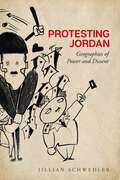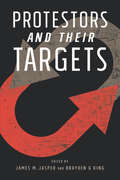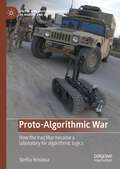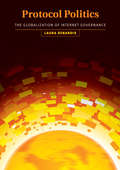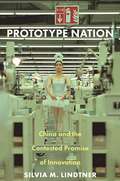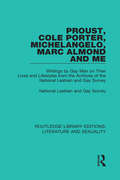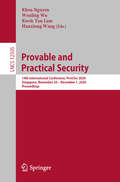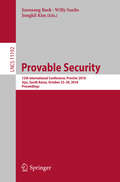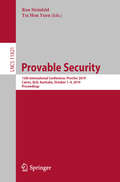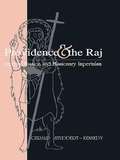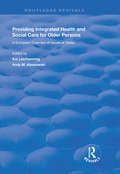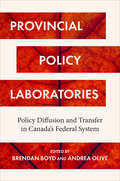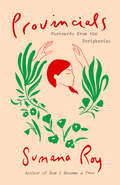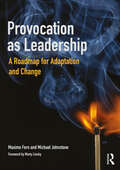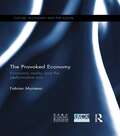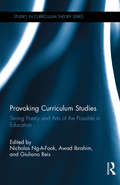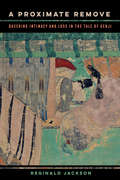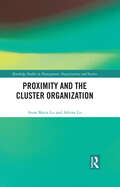- Table View
- List View
Protesting Jordan: Geographies of Power and Dissent (Stanford Studies in Middle Eastern and Islamic Societies and Cultures)
by Jillian SchwedlerProtest has been a key method of political claim-making in Jordan from the late Ottoman period to the present day. More than moments of rupture within normal-time politics, protests have been central to challenging state power, as well as reproducing it—and the spatial dynamics of protests play a central role in the construction of both state and society. With this book, Jillian Schwedler considers how space and geography influence protests and repression, and, in challenging conventional narratives of Hashemite state-making, offers the first in-depth study of rebellion in Jordan. Based on twenty-five years of field research, Protesting Jordan examines protests as they are situated in the built environment, bringing together considerations of networks, spatial imaginaries, space and place-making, and political geographies at local, national, regional, and global scales. Schwedler considers the impact of time and temporality in the lifecycles of individual movements. Through a mixed interpretive methodology, this book illuminates the geographies of power and dissent and the spatial practices of protest and repression, highlighting the political stakes of competing narratives about Jordan's past, present, and future.
Protestkommunikation: Konflikte um die Legitimität politischer Öffentlichkeit (Medienkulturen im digitalen Zeitalter)
by Kornelia Hahn Andreas LangenohlPolitische Öffentlichkeit beruht auf Vorstellungen legitimer Formen öffentlicher Kommunikation. Gerade diese werden durch Protestkommunikation häufig herausgefordert. Hierzu versammelt der Band Beiträge, die unterschiedliche Perspektiven auf diese Protestkommunikation bearbeiten: den Streit über die Legitimität politischer Öffentlichkeit als Motor von Protest, die Anrufung von Öffentlichkeit als Symbol gesellschaftlicher Allgemeinheit sowie die vieldeutige Medialität von Protestkommunikation.
Protestors and Their Targets
by Brayden G KingThe strategic interactions between protestors and their targets shape the world around us in profound ways. The editors and contributors to Protesters and Their Targets—all leading scholars in the study of social movements—look at why movements do what they do and why their interactions with other societal actors turn out as they do. They recognize that targets are not stationary but react to the movement and require the movement to react back. This edited collection analyzes how social movements select their targets, movement-target interactions, and the outcomes of those interactions. Case studies examine school closures in Sweden, the U.S. labor movement, Bolivian water and Mexican corn, and other global issues to show the strategic thinking, shifting objectives, and various degrees of success in the actions and nature of these protest movements. Protesters and Their Targets seeks to develop a set of tools for the further development of the field’s future work on this underexplored set of interactions.
Proto-Algorithmic War: How the Iraq War became a laboratory for algorithmic logics (Social and Cultural Studies of Robots and AI)
by Stefka HristovaDuring the Iraq War, American soldiers were sent to both fight an enemy and to recover a “failed state” in pixelated camouflage uniforms, accompanied by robots, and armed with satellite maps and biometric hand-held scanners. The Iraq War, however, was no digital game: massive-scale physical death and destruction counter the vision of a clean replayable war. The military policy of the United States, and not the actual experience of war, has been rooted in the logic of digital, and nascent algorithmic technology. This logic attempted to reduce culture, society, as well as the physical body and environment into visual data that lacks cultural and historical context. This book details the emergence of a nascent algorithmic war culture in the context of the Iraq War (2003-2010) in relation to the data-driven early 20th century British Mandate for Iraq. Through a series of five inquiries into the ways in which the Iraq War attempted to and often failed to see population and territory as digital and further proto-algorithmic entities, it offers an insight into the digitization and further unmanned automaton of war. It does so through a comparative historical framework reaching back to the quantification techniques harnessed during the British Mandate for Iraq (1918-1932) in order to explicate the parallels and complicated the diversions between the numerical logics that have driven both military state-building enterprises.
Protocol: The Power of Diplomacy and How to Make It Work for You
by Capricia Penavic MarshallPresident Obama’s former United States chief of protocol looks at why diplomacy and etiquette matter—from the international stage to everyday life.History often appears to consist of big gestures and dramatic shifts. But for every peace treaty signed, someone set the stage, using hidden influence to effect the outcome. In her roles as chief of protocol for President Barack Obama and social secretary to President Bill Clinton and First Lady Hillary Clinton, Capricia Penavic Marshall not only bore witness to history, she facilitated it. From arranging a room to have an intended impact on the participants to knowing which cultural gestures earned trust, her behind-the scenes preparations laid the groundwork for successful diplomacy between heads of state around the world and tilted the playing field in her team's favor.If there's one thing that working at the highest levels of government for over two decades has taught Marshall, it's that there is power in detail and nuance—the micro-moves that affect the macro-shifts. When seemingly minor aspects of an engagement go missing or awry—a botched greeting or even a poorly chosen menu—it alters the emotions and tenor of an exchange, setting up obstacles rather than paving a way forward. In some cases, an oversight may put the entire endeavor in jeopardy. Sharing unvarnished anecdotes from her time in office—harrowing near misses, exhilarating triumphs, heartwarming personal stories—Marshall brings us a master class in soft power, unveiling the complexity of human interactions and making the case that etiquette, cultural IQ, and a flexible mind-set matter now more than ever. When the notion of basic civility seems to be endangered, Protocol reminds us how critical these principles are while providing an accessible guide for anyone who wants to be empowered by the tools of diplomacy in work and everyday life.
Protocol Politics: The Globalization of Internet Governance (Information Revolution and Global Politics)
by Laura DenardisWhat are the global implications of the looming shortage of Internet addresses and the slow deployment of the new IPv6 protocol designed to solve this problem?The Internet has reached a critical point. The world is running out of Internet addresses. There is a finite supply of approximately 4.3 billion Internet Protocol (IP) addresses—the unique binary numbers required for every exchange of information over the Internet—within the Internet's prevailing technical architecture (IPv4). In the 1990s the Internet standards community selected a new protocol (IPv6) that would expand the number of Internet addresses exponentially—to 340 undecillion addresses. Despite a decade of predictions about imminent global conversion, IPv6 adoption has barely begun. Protocol Politics examines what's at stake politically, economically, and technically in the selection and adoption of a new Internet protocol. Laura DeNardis's key insight is that protocols are political. IPv6 intersects with provocative topics including Internet civil liberties, US military objectives, globalization, institutional power struggles, and the promise of global democratic freedoms. DeNardis offers recommendations for Internet standards governance, based not only on technical concerns but on principles of openness and transparency, and examines the global implications of looming Internet address scarcity versus the slow deployment of the new protocol designed to solve this problem.
Prototype Nation: China and the Contested Promise of Innovation (Princeton Studies in Culture and Technology #29)
by Silvia M. LindtnerA vivid look at China’s shifting place in the global political economy of technology production How did China’s mass manufacturing and “copycat” production become transformed, in the global tech imagination, from something holding the nation back to one of its key assets? Prototype Nation offers a rich transnational analysis of how the promise of democratized innovation and entrepreneurial life has shaped China’s governance and global image. With historical precision and ethnographic detail, Silvia Lindtner reveals how a growing distrust in Western models of progress and development, including Silicon Valley and the tech industry after the financial crisis of 2007–8, shaped the rise of the global maker movement and the vision of China as a “new frontier” of innovation.Lindtner’s investigations draw on more than a decade of research in experimental work spaces—makerspaces, coworking spaces, innovation hubs, hackathons, and startup weekends—in China, the United States, Africa, Europe, Taiwan, and Singapore, as well as in key sites of technology investment and industrial production—tech incubators, corporate offices, and factories. She examines how the ideals of the maker movement, to intervene in social and economic structures, served the technopolitical project of prototyping a “new” optimistic, assertive, and global China. In doing so, Lindtner demonstrates that entrepreneurial living influences governance, education, policy, investment, and urban redesign in ways that normalize the persistence of sexism, racism, colonialism, and labor exploitation.Prototype Nation shows that by attending to the bodies and sites that nurture entrepreneurial life, technology can be extricated from the seemingly endless cycle of promise and violence.Cover image: Courtesy of Cao Fei, Vitamin Creative Space and Sprüth Magers
Proud Shoes: The Story of an American Family
by Pauli MurrayFirst published in 1956, Proud Shoes is the remarkable true story of slavery, survival, and miscegenation in the South from the pre-Civil War era through the Reconstruction. Written by Pauli Murray the legendary civil rights activist and one of the founders of NOW, Proud Shoes chronicles the lives of Murray's maternal grandparents. From the birth of her grandmother, Cornelia Smith, daughter of a slave whose beauty incited the master's sons to near murder to the story of her grandfather Robert Fitzgerald, whose free black father married a white woman in 1840, Proud Shoes offers a revealing glimpse of our nation's history.
Proust, Cole Porter, Michelangelo, Marc Almond and Me: Writings by Gay Men on Their Lives and Lifestyles from the Archives of the National Lesbian and Gay Survey (Routledge Library Editions: Literature and Sexuality #5)
by National Lesbian & Gay SurveyDrawn from years of archive material, this collection, first published in 1993, portrays the voices and experience of over sixty gay men from all walks of life. Here are presented the difficulties of coming out, but also the diverse nature of gay relationships and the impact of HIV and AIDS. Sometimes raw, often humorous, frequently angry, the book gives an honest impression of what it was like to live as a homosexual man in the twentieth century.
Provable and Practical Security: 14th International Conference, ProvSec 2020, Singapore, November 29 – December 1, 2020, Proceedings (Lecture Notes in Computer Science #12505)
by Khoa Nguyen Wenling Wu Kwok Yan Lam Huaxiong WangThis book constitutes the refereed proceedings of the 14th International Conference on Provable Security, ProvSec 2020, held in Singapore, in November 2020. The 20 full papers presented were carefully reviewed and selected from 59 submissions. The papers focus on provable security as an essential tool for analyzing security of modern cryptographic primitives. They are divided in the following topical sections: signature schemes, encryption schemes and NIZKS, secure machine learning and multiparty computation, secret sharing schemes, and security analyses.* The conference was held virtually due to the COVID-19 pandemic.
Provable Security: 12th International Conference, ProvSec 2018, Jeju, South Korea, October 25-28, 2018, Proceedings (Lecture Notes in Computer Science #11192)
by Joonsang Baek Willy Susilo Jongkil KimThis book constitutes the refereed proceedings of the 12th International Conference on Provable Security, ProvSec 2018, held in Jeju, South Korea, in October 2018. The 21 full and 4 short papers presented were carefully reviewed and selected from 48 submissions. The papers are grouped in topical sections on foundation. Public key encryption, digital signature, symmetric key cryptography, and applications.
Provable Security: 13th International Conference, ProvSec 2019, Cairns, QLD, Australia, October 1–4, 2019, Proceedings (Lecture Notes in Computer Science #11821)
by Ron Steinfeld Tsz Hon YuenThis book constitutes the refereed proceedings of the 13th International Conference on Provable Security, ProvSec 2019, held in Cairns, QLD, Australia, in October 2019. The 18 full and 6 short papers presented were carefully reviewed and selected from 51 submissions. The papers focus on provable security as an essential tool for analyzing security of modern cryptographic primitives, including a special theme on “Practical Security.”
Providence and the Raj
by Gerald Studdert-KennedyThe interconnection between British Christianity and British imperialism in India is a widely acknowledged historical fact. Despite this, there are few books which study this phenomenon. Informed by an essentially Gramscian analysis of colonial discourse, this pioneering book identifies fundamental `religious' and ideological commonalities that linked British policies in the domestic and imperial arenas and throws fresh light on the construction and collapse of the Raj.
Providing Integrated Health and Social Services for Older Persons: A European Overview of Issues at Stake (Routledge Revivals)
by Andy M. AlaszewskiOriginally published in 2004. Providing Integrated Health and Social Care for Older Persons - Issues, Problems and Solutions (PROCARE)" is a project in the EU Fifth Framework Programme (Quality of Life and Management of Living Resources, Area "The Ageing Population and Disabilities") that aims to help in defining the new concept of an integrated health and social care for older persons in need of care by comparing and evaluating different modes of care delivery. The project will identify structural, organisational, economic and social-cultural factors and actors that constitute an integrated and sustainable care system with enhanced outcomes for all actors involved. This book gathers the achievements of the first project phase (2002) that consisted in a literature overview focusing on the question which of the variety of innovations in modes of organisation, finance and professional collaboration observed in Europe over the last decade have been the most successful and long-lasting ones. Thus, national reports from nine EU Member States (Austria, Denmark, Finland, France, Germany, Greece, Italy, the Netherlands and the UK) will be presented by scholars from leading research and consulting agencies in these countries. The national reports follow a mutually agreed structure. The publication is introduced by a general overview and a more theoretic article defining the issues at stake. The book gives a unique general overview on European approaches towards integrated social and health care services and policies that are to be developed to face the growing need of care in ageing societies; furthermore, it provides indicators for successful approaches and models of good practice to overcome the "social-health-divide" and a better understanding of the meaning of integrated services and coordination of social and health systems in the different countries. Finally, facts and figures about coordination at the interface between health and social care for older persons as well as problems and solutions (
Provincial Policy Laboratories: Policy Diffusion and Transfer in Canada’s Federal System
by Brendan Boyd and Andrea OliveCanada's federal system, composed of ten provincial governments and three territories, all with varying economies and political cultures, is often blamed for the country's failure to develop coordinated policy responses to key issues. But in other federal and multi-level governance systems, the ability of multiple governments to test a variety of policy responses has been lauded as an effective way to build local and national policy. Despite high-profile examples of policy diffusion in Canada, there has been surprisingly little academic study of policy learning and diffusion among provinces. Featuring cutting-edge research, Provincial Policy Laboratories explores the cross-jurisdictional movement of policies among governments in Canada’s federal system. The book comprises case studies from a range of emerging policy areas, including parentage rights, hydraulic fracturing regulations, species at risk legislation, sales and aviation taxation, and marijuana regulation. Throughout, the contributors aim to increase knowledge about this understudied aspect of Canadian federalism and contribute to the practice of intergovernmental policymaking across the country.
Provincials: Postcards from the Peripheries
by Sumana RoyAn enchanting and joyous exploration of life and creativity at the geographical edges of the modern world Who is a provincial? In this subversive book, Sumana Roy assembles a striking cast of writers, artists, filmmakers, cricketers, tourist guides, English teachers, lovers and letter writers, private tutors and secret-keepers whose lives and work provide varied answers to that question. Combining memoir with the literary, sensory, and emotional history of an ignored people, she challenges the metropolitan&’s dominance to reclaim the joyous dignity of provincial life, its tics and taunts, enthusiasms and tragicomedies. In a wide-ranging series of &“postcards&” from the peripheries of India, Europe, America, and the Middle East, Roy brings us deep into the imaginative world of those who have carried their provinciality like a birthmark. Ranging from Rabindranath Tagore to William Shakespeare, John Clare to the Bhakti poets, T. S. Eliot to J. M. Coetzee, V. S. Naipaul to the Brontës, and Kishore Kumar to Annie Ernaux, she celebrates the provincials&’ humor and hilarity, playfulness and irony, belatedness and instinct for carefree accidents and freedom. Her unprecedented account of provincial life offers an alternative portrait of our modern world.
Proving Ground: Expertise and Appalachian Landscapes
by Edward SlavishakDisrupting the intervenor narrative in Appalachian studies.The Appalachian Mountains attracted an endless stream of visitors in the twentieth century, each bearing visions of what they would encounter. Well before large numbers of tourists took to the mountains in the latter half of the century, however, networks of missionaries, sociologists, folklorists, doctors, artists, and conservationists made Appalachia their primary site for fieldwork. In Proving Ground, Edward Slavishak studies several of these interlopers to show that the travelers’ tales were the foundation of powerful forms of insider knowledge. Following four individuals and one cohort as they climbed professional ladders via the Appalachian Mountains, Slavishak argues that these visitors represented occupational and recreational groups that used Appalachia to gain precious expertise. Time spent in the mountains, in the guise of work (or play that mimicked work), distinguished travelers as master problem-solvers and transformed Appalachia into a proving ground for preservationists, planners, hikers, anthropologists, and photographers.Based on archival materials from outdoors clubs, trade journals, field notes, correspondence, National Park Service records, civic promotional materials, and photographs, Proving Ground presents mountain landscapes as a fluid combination of embodied sensation, narrative fantasy, and class privilege. Touching on critical regionalism and mobility studies, this book is a boundary-pushing cultural history of expertise, an environmental history of the Appalachian Mountains, and a historical geography of spaces and places in the twentieth century.
Provinz postmigrantisch: Rurale Perspektiven auf Politik, Alltag und Literatur (MiGS: Migration - Gesellschaft - Schule)
by Luise Ganter Thomas Hardtke Nazli Hodaie Miriam StockDer Band entwickelt eine postmigrantische Perspektive auf provinzielle oder provinzbezogene Kontexte und Positionierungen und vereinigt dabei literarische Perspektiven mit empirischen Zugängen zu Politik und Alltag. Es werden postmigrantische Aushandlungen in ruralen Kontexten in den Blick genommen und zudem gefragt, wie sich Vorstellungen zur „Provinz“ wie auch zur „Migration“ gegenseitig bedingen, neuformieren und wo dies konkret geschieht.
Provocation as Leadership: A Roadmap for Adaptation and Change
by Maxime Fern Michael JohnstoneTo create deep change, you have to disturb people, or at least risk doing so. Shaking people out of their comfort zones not only generates the possibility of change but also elicits new information and brings out hidden resources that people need to navigate unfamiliar waters. Nevertheless, provoking without antagonizing or shutting people down and tolerating their pushback are complex challenges, requiring skill and will. This is the first comprehensive provocation roadmap: why provocation is necessary for effectively leading change, the different forms of provocation, action tools and frameworks, and case studies illustrating how change is achieved through the sustained and careful use of provocation and disturbance, with strategies and tactics for minimizing the risks involved. We illustrate, for example, how two Australian farmers challenged centuries-old farming practice to regenerate their properties and how a large American bank used the death of a revered CEO to reinvigorate the business. We show how a young indigenous school principal tackled entrenched attitudes to turn a failing school around and how a national statistical service acted like a technology start-up to innovate during the Covid-19 pandemic. The case studies address change at the local level, within organizations, as well as on a national scale. We finish with a synthesis of the lessons learned and a set of ideas about building people’s capacity to use provocation to live, learn, and thrive. Provocation as Leadership offers a blueprint for people who, using provocation, want to ignite change and help their organizations, group, or community break through to a better future. This book provides a vehicle to see provocation in its potential for necessary disturbance, to lay bare its anatomy, and give access to its possibilities, including how to enable provocateurs to live another day.
Provocative Plastics: Their Value in Design and Material Culture
by Susan LambertPlastics have now been our most used materials for over fifty years. This book adopts a new approach, exploring plastics’ contribution from two perspectives: as a medium for making and their value in societal use. The first approach examines the multivalent nature of plastics materiality and their impact on creativity through the work of artists, designers and manufacturers. The second perspective explores attitudes to plastics and the different value systems applied to them through current research undertaken by design, materials and socio-cultural historians. The book addresses the environmental impact of plastics and elucidates the ways in which they can and must be part of the solution. The individual viewpoints are provocative and controversial but together they present a balanced and scholarly un-picking of the debate that surrounds this ubiquitous group of materials. The book is essential reading for a wide academic readership interested in the Arts and Humanities, especially Design and Design History; Anthropology; and Cultural, Material and Social Histories.
The Provocativo Joan Robinson: The Making of a Cambridge Economist
by Nahid Aslanbeigui Guy OakesOne of the most original and prolific economists of the twentieth century, Joan Robinson (1903-83) is widely regarded as the most important woman in the history of economic thought. Robinson studied economics at Cambridge University, where she made a career that lasted some fifty years. She was an unlikely candidate for success at Cambridge. A young woman in 1930 in a university dominated by men, she succeeded despite not having a remarkable academic record, a college fellowship, significant publications, or a powerful patron. In The Provocative Joan Robinson, Nahid Aslanbeigui and Guy Oakes trace the strategies and tactics Robinson used to create her professional identity as a Cambridge economist in the 1930s, examining how she recruited mentors and advocates, carefully defined her objectives, and deftly pursued and exploited opportunities. Aslanbeigui and Oakes demonstrate that Robinson's professional identity was thoroughly embedded in a local scientific culture in which the Cambridge economists A. C. Pigou, John Maynard Keynes, Dennis Robertson, Piero Sraffa, Richard Kahn (Robinson's closest friend on the Cambridge faculty), and her husband Austin Robinson were important figures. Although the economists Joan Robinson most admired--Pigou, Keynes, and their mentor Alfred Marshall--had discovered ideas of singular greatness, she was convinced that each had failed to grasp the essential theoretical significance of his own work. She made it her mission to recast their work both to illuminate their major contributions and to redefine a Cambridge tradition of economic thought. Based on the extensive correspondence of Robinson and her colleagues, The Provocative Joan Robinson is the story of a remarkable woman, the intellectual and social world of a legendary group of economists, and the interplay between ideas, ambitions, and disciplinary communities.
The Provoked Economy: Economic Reality and the Performative Turn (CRESC)
by Fabian MuniesaDo things such as performance indicators, valuation formulas, consumer tests, stock prices or financial contracts represent an external reality? Or do they rather constitute, in a performative fashion, what they refer to? The Provoked Economy tackles this question from a pragmatist angle, considering economic reality as a ceaselessly provoked reality. It takes the reader through a series of diverse empirical sites – from public administrations to stock exchanges, from investment banks to marketing facilities and business schools – in order to explore what can be seen from such a demanding standpoint. It demonstrates that descriptions of economic objects do actually produce economic objects and that the simulacrum of an economic act is indeed a form of realization. It also shows that provoking economic reality means facing practical tests in which what ought to be economic or not is subject to elaboration and controversy. This book opens paths for empirical investigation in the social sciences, but also for the philosophical renewal of the critique of economic reality. It will be useful for students and scholars in social theory, sociology, anthropology, philosophy and economics.
Provoking Curriculum Studies: Strong Poetry and Arts of the Possible in Education (Studies in Curriculum Theory Series)
by Nicholas Ng-A-Fook, Awad Ibrahim and Giuliano ReisProvoking Curriculum Studies pushes forward a strong reading of the theoretical and methodological innovations taking place within curriculum studies research. Addressing an important gap in contemporary curriculum studies—conceptualizing scholars as poets and the potential of the poetic in education—it offers a framework for doing curriculum work at the intersection of the arts, social theory, and curriculum studies. Drawing on poetic inquiry, psychoanalysis, phenomenology, life writing, and several types of arts-based research methodologies, this diverse collection spotlights the intellectual genealogies of curriculum scholars such as Ted Aoki, Geoffrey Milburn and Roger Simon, whose provocations, inquiries, and recursive questioning link the writing and re-writing of curriculum theory to acts of strong poetry. Readers are urged to imagine alternative ways in which professors, teachers, and university students might not only engage with but disrupt, blur, and complicate curriculum theory across interdisciplinary topographies in order to seek out blind impresses—those areas of knowledge that are left over, unaddressed by ‘mainstream’ curriculum scholarship, and that instigate difficult questions about death, trauma, prejudice, poverty, colonization, and more.
A Proximate Remove: Queering Intimacy and Loss in The Tale of Genji (New Interventions in Japanese Studies #2)
by Reginald JacksonA free ebook version of this title is available through Luminos, University of California Press's Open Access publishing program. Visit www.luminosoa.org to learn more. How might queer theory transform our interpretations of medieval Japanese literature and how might this literature reorient the assumptions, priorities, and critical practices of queer theory? Through a close reading of The Tale of Genji, an eleventh-century text that depicts the lifestyles of aristocrats during the Heian period, A Proximate Remove explores this question by mapping the destabilizing aesthetic, affective, and phenomenological dimensions of experiencing intimacy and loss. The spatiotemporal fissures Reginald Jackson calls "proximate removes" suspend belief in prevailing structures. Beyond issues of sexuality, Genji queers in its reluctance to romanticize or reproduce a flawed social order. An understanding of this hesitation enhances how we engage with premodern texts and how we question contemporary disciplinary stances.
Proximity and the Cluster Organization (Routledge Studies in Management, Organizations and Society)
by Anna Maria Lis Adrian LisIncluding the category of proximity in theoretical considerations and empirical analyzes in cluster organizations is an attempt to integrate existing approaches to understand and explain the specificity of inter-organizational cooperation developed in geographical proximity. The importance of geographical proximity to create a competitive advantage is emphasized in all theories on the establishment and development of industrial clusters. However, proximity should not be perceived only in the geographical dimension. The similarity of knowledge systems (cognitive proximity), relationships based on trust (social proximity), organizational links (organizational proximity), and finally the similarity of institutional operating conditions (institutional proximity) enable and facilitate the development of cooperation relationships between business entities. Each of the above-mentioned threads deals separately with issues that have much in common, namely they can be treated as different dimensions of the same concept – proximity. Proximity provides a specific concretization of the features, processes and mechanisms underlying inter-organizational cooperation, and thus facilitates its understanding, increasing the possibility of its effective management. The study provides new important elements to the current system of knowledge, filling in the cognitive and research gaps in the scientific literature on problems related to proximity development in cluster organizations. The new element includes a multidimensional concept of proximity explaining its role in the development of cooperative relationships in the cluster organizations. A strong point of the developed concept is its inductive-abductive origin and the use of grounded theory methodology, which is rare in the studies of cluster organizations. The developed concept has also significant practical advantages since it allows to consciously shape proximity in COs, thus contributing to the development of cooperation between cluster enterprises.
